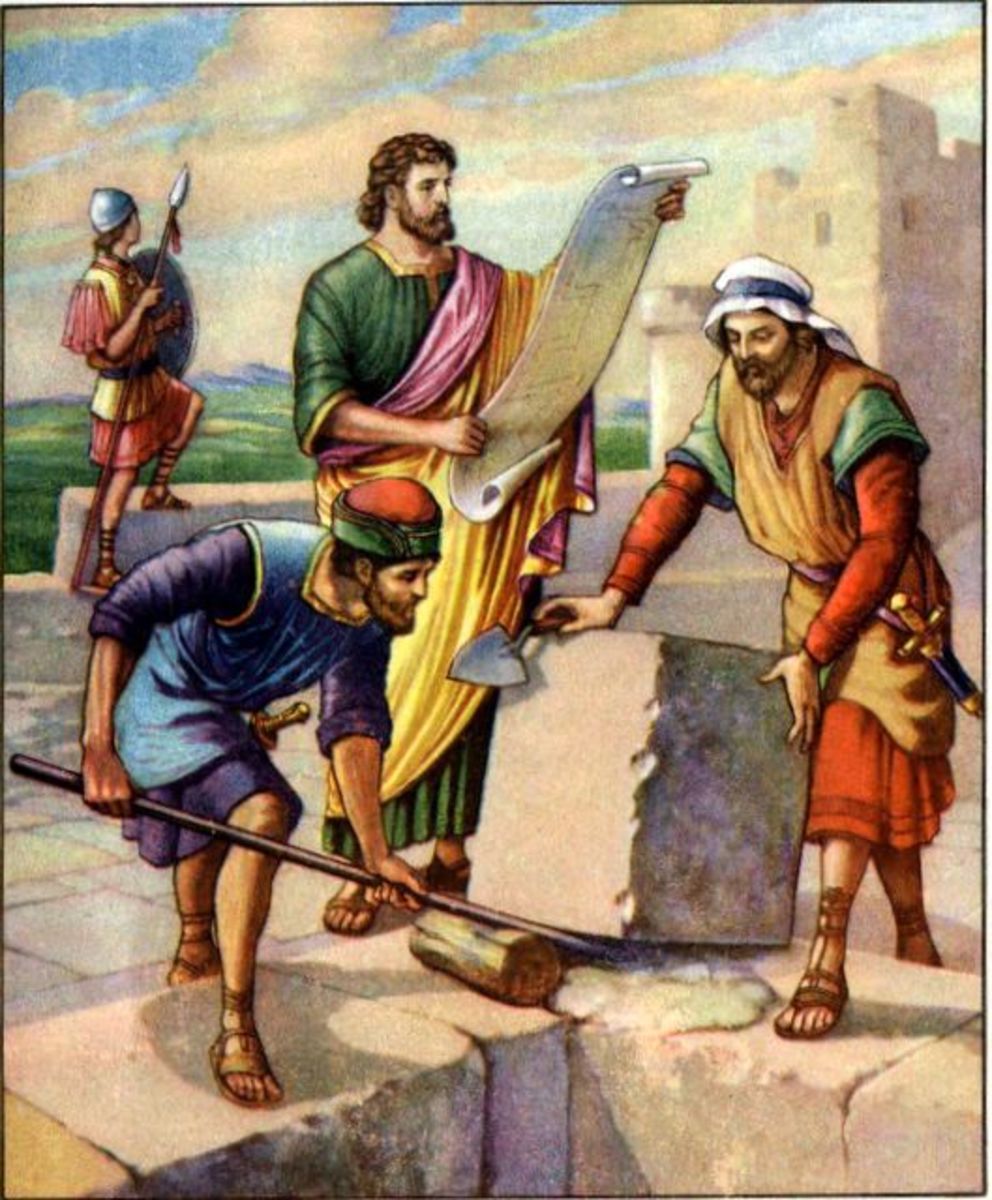Lessons for Life From The Old Testament: Nehemiah

Lesson for today from the Old Testament: Nehemiah
In a world where good leadership is needed more than ever, Nehemiah is a great example of leadership to look at. Here a pretty ordinary person, working as a cup bearer for the King of Persia, takes on a huge task and using great leadership skills manages to achieve what he set out to do – to build a wall around the city of Jerusalem which was in ruin after it had been destroyed by Babylon in 586 BC.
After the Persians defeated the Babylonians in 539 BC, Cyrus the second allowed some exiles to return to rebuild the temple in Jerusalem and the area became a Persian province named Yehud, with Jerusalem as its capital. In the book of Nehemiah it is recorded how Nehemiah returned to Jerusalem to rebuild the wall, even though opposed by some of the local population who did not want this to happen. The chaos that a city without a wall permitted suited their corrupt behaviour.
As we look at the way Jeremiah achieved the remarkable feat of rebuilding the wall in just 52 days (Nehemiah 6:15), there are several important leadership skills that he had that are apparent:
- Nehemiah was moved by compassion and concern for the people. In Nehemiah 1:4 it is recorded that when Nehemiah heard about the state of Jerusalem and the conditions that the people were living in he wept, mourned and fasted. A leader who has compassion for others is driven by a vision of what can be done to improve the situation for them. Jesus wept when he saw what the religious leaders of his time had done to the same city (John 11:35). Today it seems as if many leaders in many different sectors are motivated by greed rather than compassion.
- Nehemiah looked for help and guidance from God. In today’s world where most leaders seem to want to “go it on their own”, it would be good for every leader to spend some time in prayer and to submit their needs for guidance to God. Long gone is the time in the western world where important meetings and conferences where opened in prayer. We seem to have become confident is our self sufficiency rather than submitting ourselves to God’s wisdom and guidance. Not only did Nehemiah go to God, he also appealed to the King of Persia for much needed help in order to achieve what needed to be accomplished.
- Nehemiah had a plan and did the necessary ground work. The record shows that he went out at night to inspect the present situation carefully before putting his plan into action. “And I went out by night through the Valley Gate to the Serpent Well and the Refuse Gate and viewed the walls of Jerusalem which were broken down and its gates which were burned with fire” (Nehemiah 2:13 NKJV). Good leadership needs a careful evaluation of what can and needs to be done. Analysis of the situation leaders finds themselves in, is an important first step in the action needed.
- Nehemiah dealt with the opposition wisely. As he began to build the wall those who opposed it used every means available to disrupt the work including sowing confusion, debate and even violence. Nehemiah showed that there was a time to talk and a time to simply get on with the work. When physical danger loomed he armed his builders to meet that threat, but because he had a vision and a plan he did not let anything get in his way.
- Nehemiah delegated responsibility. It would have been impossible for him to “go it on his own” and so he chose workers to each take responsibility for a part of the rebuilding. Chapter 3 lists in detail who was responsible for which gate or part of the wall and in chapter 2:20, the words of Nehemiah are recorded “The god of heaven Himself will prosper us therefore we His servants will arise and build...” A great leader inspires his work force with great words of encouragement!
- Nehemiah showed compassion and fairness. It was apparent that corruption was rife in the broken city of Jerusalem. A nation that earlier were slaves in Egypt and then in Babylon, were now having to sell their children into slavery to pay the debt that they had occurred from the money lenders in Jerusalem (5:1-8). So Nehemiah put an end to that. He forewent his own salary and that of his brothers to not put a further burden on the already struggling population (5:14-19).
- Nehemiah inspired a work ethic. The task was completed because the “people had a will to work” (4:6). Leadership that sets the right example, that shows compassion and love, that has a clear vision and that leads in a Godly way inspires peoples to work. While the “nobles” in Jerusalem showed none of these characteristics and so the situation in Jerusalem was a disaster, most people will follow a good example and work hard if challenged. Nehemiah did that with God’s help and so the work was done and everyone benefitted, except those who were corrupt. While power often corrupts, Jeremiah is a shining example that this does not always have to be so.
Reference:
The illustrated Bible Dictionary.
NKJV Scripture taken from the New King James Version. Copyright 1982 by Thomas Nelson, Inc. Used by permission. All rights reserved.






